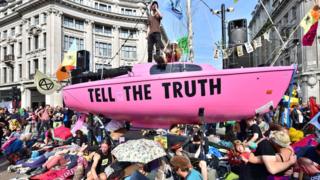
Protests by Extinction Rebellion’s seemingly inexhaustible army of activists made plenty of headlines last week.
They say politicians are out of touch with climate reality. But what do they want, and can ministers realistically make it happen?
Let’s consider XR’s three core demands: for the government to “tell the truth about climate change”; to create a citizens’ assembly to oversee progress; and to reduce carbon emissions to zero by 2025.
- If Mrs May regularly referred to a “climate crisis” or “climate emergency”, that might fill their wish that the government should “tell the truth”.
- A citizens’ assembly looks unlikely, especially during the current constitutional mayhem of Brexit.
- And the third objective of cutting CO2 emissions to almost zero by 2025 is surely unachievable.
So, if not all this, then what?
This weekend, I asked environmentalists on Twitter for their suggestions about what ministers can do to show XR they mean business.
Here – in no particular order – is my summary of some of the responses, with my own micro-analysis along the way.
Heathrow expansion – Just cancel it, many said: impose a graduated tax on frequent fliers instead
This would be a huge symbolic step. Aviation forms a small proportion of UK emissions – but this would denote that ministers accept that climate change cannot be stopped by constantly fuelling a demand for growth.
Home insulation – One said insulating the UK’s draughty housing stock should become a National Infrastructure Priority – similar to upgrading the rail network
This would be a big victory for protesters. The Treasury don’t like subsidising property owners to improve the value of their houses – but there are few other plausible solutions big enough to tackle a vast problem.
Make electric cars work, others tweeted. They say the Department for Transport is failing to deliver a charging network
This is vitally important. The government is committed to zero emissions cars anyway, as part of its long-term climate plans. But ministers have been relying on the market to provide a charging network. And it hasn’t.
I recently borrowed an electric car for a trial visit to in deepest Dorset. Both local charging stations malfunctioned, so I plugged into my sister-in-law’s house. It blew her electrics. Sorry, Jane.
How about getting farmers to cut emissions? UK farming has barely reduced emissions and some experts want widespread re-wilding so trees can capture CO2
This farming challenge can’t be ducked. The government knows farmers have to cut emissions faster, but it’s keen to protect them from economic damage. At least there’s more policy flexibility with Brexit.
The UK might want more fossil fuels for the time being, but round the world we’ve already discovered more than we can burn to stabilise the climate.
If the ministers adopted this suggestion, it would show they were willing to put climate protection ahead of concerns over tax-raising and balance of payments. A tough ask for the Treasury, but one protesters say must be met if ministers really are serious about the climate. d.

Media playback is unsupported on your device
Bring back onshore wind, they say: it’s cheap and effective
Another policy that would show ministers are putting the climate before politics. Onshore wind farms are popular with the public at large but ministers rejected them after a fusillade of protests from constituents.
The Bank of England governor Mark Carney seems already to be tip-toeing in this direction with his warnings to banks and firms about the risks of climate change. But how far can the present system change without breaking?
Get a move on, came another call. Many said if we really want to tackle climate change we should be going as fast as we can, not setting arbitrary target dates like 2050
This is a tricky one. Governments like to deal in hard numbers and targets, not “try your best” aphorisms. Even in the relatively climate-conscious nations those numbers aren’t always hit.
And how about ending consumerist capitalism?
My correspondents are divided on this.
Some think the current political system can deliver the investment needed for a carbon neutral economy, if ministers put the right policies in place urgently.
Other say only the overthrow of capitalism will protect the planet. The debate surely needs to be had, given the severity of the crisis in Nature.
So what does the government say?
It says it is taking the climate protests seriously and rightly points out that it’s been an international leader with its Climate Change Act.
It will shortly consider whether to shift the UK’s long-term climate target to virtually zero emissions by 2050 – that’s tougher than the current 80% reduction by 2050. It admits that it’s falling short of its medium-term climate targets.
Will the changes I’ve outlined here be enough to satisfy XR? Maybe not – but they might weaken the movement by seducing some of their less ardent supporters.
Follow Roger on Twitter @rharrabin
Source: BBC News – Science & Environment






